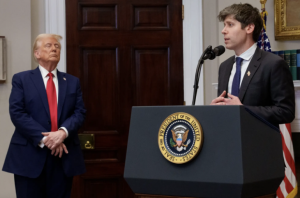CSU Chancellor’s Office holds web conference to present issue-solving proposals
February 10, 2016
Representatives of the CSU Chancellor’s Office held a live web conference on Friday, Feb. 5 to present solutions for Cal State-wide issues, including the possible faculty strike.
The web conference consisted of propositions and ideas to solve system-wide financial and academic issues, followed by a student question-and-answer session.
Beginning the conference, Ryan Storm, CSU Assistant Vice Chancellor for Budget, explained the CSU Task Force for a Sustainable Financial Model and its mission regarding primary areas of concern.
Regarding administrative effectiveness, the Task Force presentation suggests that the CSU system seeks state funding for summer courses and private partnerships for facility needs.
Within the area of revenue, it was suggested that small annual increases in tuition occur alongside inflation.
“It is clear that, going forward, tuition cannot remain flat indefinitely … When there is an inevitable need to increase tuition, the CSU [should] do so in a modest and predictable way to allow students and families to plan for these changes,” said Storm.
Storm also presented the Task Force’s suggestions to improve education quality. These proposals included: expanding research funding, enhancing English and Math skill preparation and moving forward with a redirection process to place denied CSU applicants into Cal State schools with available space, should they meet admission requirements.
Following Storm, Toni Molle, CSU Public Affairs Director, addressed labor relation concerns.
Molle first explained the 68.9 million dollar budget gap between the CSU and California Faculty Association (CFA) suggestions for labor compensation.
The CSU set aside $32.8 million for a 2 percent salary increase, the CFA suggesting a budget of $101.7 million for a 5 percent increase.
Although the budget gap is large, “we continue to value our faculty and we believe that faculty should be compensated for their contribution to our students and campuses,” said Molle. “That’s why, in the last three years, we have invested $129.6 million in employee compensation.”
“The bargaining team for the CSU and … for CFA have been meeting since May to reach an agreement. In July, both bargaining groups determined that they could no longer make further progress,” said Molle.
In the case of further disagreement and a possible strike, “campuses will remain open, and most classes will continue to meet,” said Molle. “Students will be notified if there are any changes to the normal campus schedule.”
Next, Nathan Evans, CSU Chief of Staff for Academic and Student Affairs, addressed issues regarding academics, focusing primarily on improving both six-year and four-year graduation rates for both four-year and transfer students.
“We know that many students across CSU campuses are working and … balancing other elements of life around their schooling, so online courses can often help a student fill out their class schedule and make quick progress to [a] degree,” said Evans, giving a primary suggestion for increasing on-time graduation rates.
Evans also presented the idea of evaluating similar courses across CSU campuses and implementing the most effective strategies into one universal course to reduce the number of non-passing students.
Chancellor’s Office representatives closed the presentation with a Q&A session. CSU students across California were able to voice their concerns regarding various academic issues that will be addressed as 2016 progresses.





